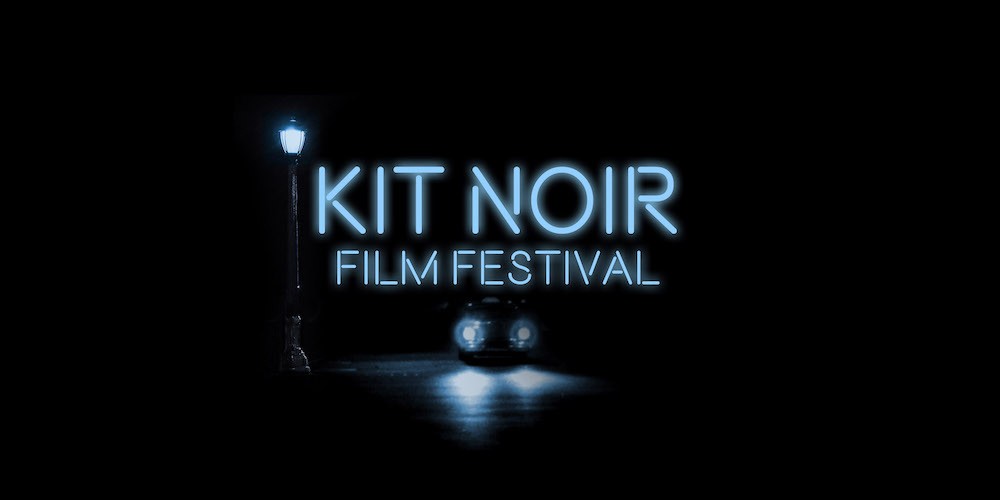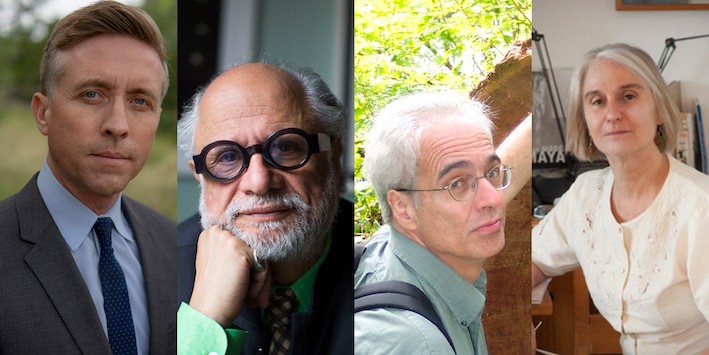Columbia Presents "Virtual" Dr. Saul and Dorothy Kit Film Noir Festival
MARCH 11–21, 2021
The Dr. Saul and Dorothy Kit Film Noir Festival
Border Incidents: The US-Mexico Border in Film Noir
Programmed by Rob King, Film & Media Studies
Managed by Soheil Rezayazdi, Columbia Film
The US-Mexico border has long been both a third rail in American politics and a recurrent setting in crime fiction. It is a place where goods entering the U.S. can become “contraband” and the citizens of neighboring states “undocumented immigrants.” Yet the border is also a zone through which domestic crime seeks its own escape, evading the arm of U.S. law to find safe haven. The border has in this way functioned in American popular culture as a shadow zone where categories of legality and illegality are constructed and reconstructed; a place, one might imagine, ripe for noir.
Cinema scholars have traditionally linked noir to themes of existential alienation. As Jonathan Auerbach argues in Dark Borders (2011), however, such alienation needs to be grounded in specific and historical postwar fears about “the inability to decide between American and un-American.” Communism was one source of such fears, of course (as the “House Un-American Activities Committee” indicates). This online iteration of the Dr. Saul and Dorothy Kit Film Noir Festival shows that the southern border soon became another – especially following the passage of the Emergency Farm Labor Program in 1942, which permitted millions of Mexican guest workers into the country to cope with wartime labor shortages.
If, however, the southern border has come to exist in our contemporary political imagination largely as a zone for law’s punitive exercise, then postwar noir instead imagined the border as the object of both law and desire. The border is, accordingly, a site to be policed in films like Border Incident (1949), in which federal agents work to bust a human smuggling ring operated by an unscrupulous American farm boss. But it is also the longed-for way out for those for whom American life has become a trap – an escape hatch from a murder charge in Where Danger Lives (1950), a space for sexual and romantic freedom in Out of the Past (1947), or the threshold to the promise of a normal family life in Gun Crazy (1950). In Orson Welles’ Touch of Evil (1957), meanwhile, desire and the law are brought into a kind of collusion in the character of Vargas (Charlton Heston), who, under his Mexican name “Miguel,” is the object of interracial desire and, under the American name “Mike,” the agent of a law that roots out racist corruption.
This year’s abridged virtual festival presents three of these films – Border Incident, Where Danger Lives, and Touch of Evil – for free online over a two-week period. The festival will culminate in a roundtable discussion with film scholar Jonathan Auerbach, postcolonial theorist Homi Bhabha, Artes de México editor Margarita de Orellana, and Jonathan Ryan, CEO / President of RAICES (the Refugee and Immigrant Center for Education and Legal Services). At this time of unrest in America, it is our hope that these films, and the conversations they inspire, can help probe the boundaries through which nations are made and remade.
This festival is funded by a generous gift from alumnus Gordon Kit ’76 (Columbia College), in honor of his parents.
Complete Kit Noir Festival Schedule
Suggested Reading:
Jonathan Auerbach, “Noir Citizenship: Anthony Mann’s Border Incident,” Cinema Journal 47.4 (Summer 2008): 102-120
Jonathan Auerbach, Dark Borders: Film Noir and American Citizenship (Duke University Press, 2011)
Homi K. Bhabha, “The Other Question,” Screen 24.6 (Nov./Dec. 1983): 18-36
Stephen Heath, “Film and System: Terms of Analysis,” parts I and II, Screen 16.1 (1975): 7-77 and Screen 16.2 (1975): 91-113
Margarita de Orellana, Filming Pancho: How Hollywood Shaped the Mexican Revolution (Verso Books, 2009)
About the Speakers:
Jonathan Ryan
Jonathan Ryan has served as the Executive Director of the Refugee and Immigrant Center for Education and Legal Services (RAICES) since 2008. RAICES provides free and low-cost legal services to underserved immigrant children, families and refugees in Central and South Texas. Previously, he worked as a staff attorney at American Gateways where he helped to establish the Legal Orientation Program for adults in DHS detention. Jonathan received his B.A. from Columbia College in New York and is a graduate of the University of Texas School of Law.
Homi K. Bhabha
Homi K. Bhabha is the Anne F. Rothenberg Professor of the Humanities in the English and Comparative Literature Departments at Harvard University. He is the author of numerous works exploring postcolonial theory, cultural change and power, contemporary art, and cosmopolitanism. His books include Nation and Narration (1990) and The Location of Culture (1994), which was reprinted as a Routledge Classic in 2004. He is a member of the Academic Committee for the Shanghai Power Station of Art, advisor on the Contemporary and Modern Art Perspectives (CMAP) project at the Museum of Modern Art New York, and Curator in Residence of the Boston Museum of Fine Arts. He also holds honorary degrees from Université Paris 8, University College London, and the Free University Berlin.
Jonathan Auerbach
Jonathan Auerbach is Emeritus Professor of English and Distinguished Scholar-Teacher at the University of Maryland. In addition to publishing a variety of articles on American literature and film, and editing numerous volumes, he is the author of five books: Weapons of Democracy: Propaganda, Progressivism, and American Public Opinion (Johns Hopkins, 2015); Dark Borders: Film Noir and American Citizenship (Duke, 2011); Body Shots: Early Cinema’s Incarnations (California, 2007); Male Call: Becoming Jack London (Duke, 1996); and The Romance of Failure: First-Person Fictions of Poe, Hawthorne, and James (Oxford, 1989). He has been a Fulbright scholar in Hungary, Portugal, Cyprus, and Tunisia.
Margarita de Orellana
Margarita de Orellana has been editor of the journal Artes de México for thirty-three years. She received her Ph.D. in Contemporary and Comparative History in the École des Hautes Études en Sciences Sociales in Paris. Her books include Imágenes del pasado: El cine y la historia (1985), Filming Pancho Villa: How Hollywood Shaped the Mexican Revolution (1991; English translation, 2009), and La mano artisanel (2002), among others. She has also worked as a historical consultant on films and a scriptwriter for a series of documentaries on the Mexican Revolution.
Rob King
Rob King is a professor of Film and Media Studies at Columbia University and the programmer of the Dr. Saul and Dorothy Kit Film Noir Festival. He is the author of Hokum! The Early Sound Slapstick Short and Depression-Era Mass Culture (2017) and the award-winning The Fun Factory: The Keystone Film Company and the Emergence of Mass Culture (2009). He is currently working on a critical study of the career of Radley Metzger.
About Dr. Saul and Dorothy Kit
Born and raised in the early 1920s in the New York Metropolitan area, Dr. Saul Kit (Passaic, New Jersey) and Dorothy Anken Kit (Jackson Heights, Queens) were lovers of literature, theater, and film. Dorothy, an interior decorator, wrote poetry and plays in her leisure time and had a strong artistic bent, which included creating needlepoint designs based on famous works of art as well as her own original patterns, many of which were commissioned by her friends. A GI Bill undergraduate at the University of California, Berkeley, Saul went on to receive his PhD in Biochemistry from Berkeley, the location of the birth of their oldest child Sally (Syracuse, Class of 1971). Saul carried out his post-doctoral studies at the University of Chicago, where his first son, Malon (Columbia School of Engineering, Class of 1973), was born. Suffering from the bitter cold winters of Chicago, Saul subsequently moved the family to the warmest place he could find a job, Houston, Texas, where his second son, Gordon (Columbia College, Class of 1976) was born. Saul’s extraordinary 35-year scientific career included important discoveries in cancer, virology, and vaccine research. He was Chief of the section of Nucleoprotein Metabolism in the Department of Biochemistry at M.D. Anderson Hospital, and later Professor and Head of the Division of Biochemical Virology at Baylor College of Medicine, both in Houston. Saul was a recipient of numerous research grants from various government and private organizations, including the National Institutes of Health, National Science Foundation, and The American Cancer Society. In recognition of over 25 years of service, he received a Research Career Award from the National Institute of Allergy and Infectious Diseases. In 1987, Saul, along with his son Malon, were honored with the Distinguished Inventor of the Year Award for developing the world’s first genetically engineered vaccine to be licensed by the US government. Saul and Malon were granted numerous United States and international patents for their pioneering vaccine inventions, aided by their patent attorney son/brother, Gordon. Gordon’s generous gift to Columbia funds the Film Noir Festival in honor of his parents.
Acknowledgement:
Thank you to Carol Becker, Dean of Faculty; Jana Wright, Dean of Academic Administration and Planning; Roberta Albert, Gavin Browning, Ann Douglas, Alma Gabeljic, Tiffany Davis, Fernando Gonzalez Ortiz, Christina Rumpf, Kristina Tate.
Complete Kit Noir Festival Schedule

